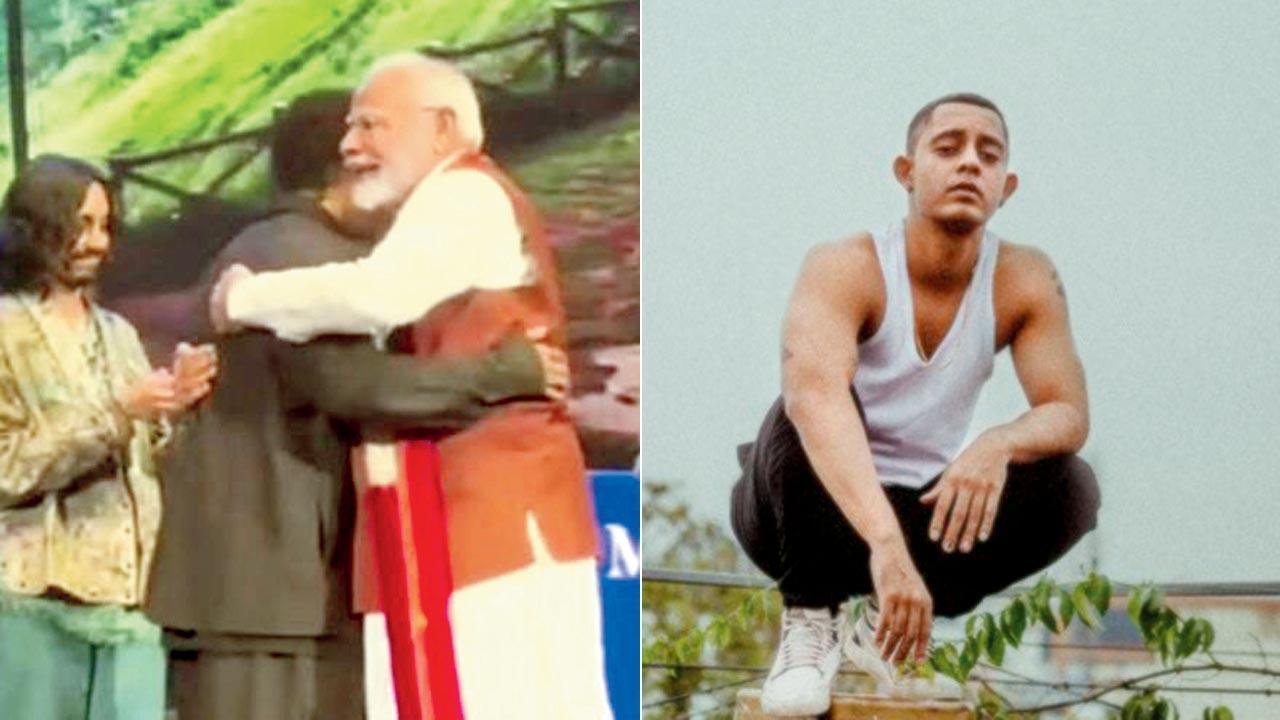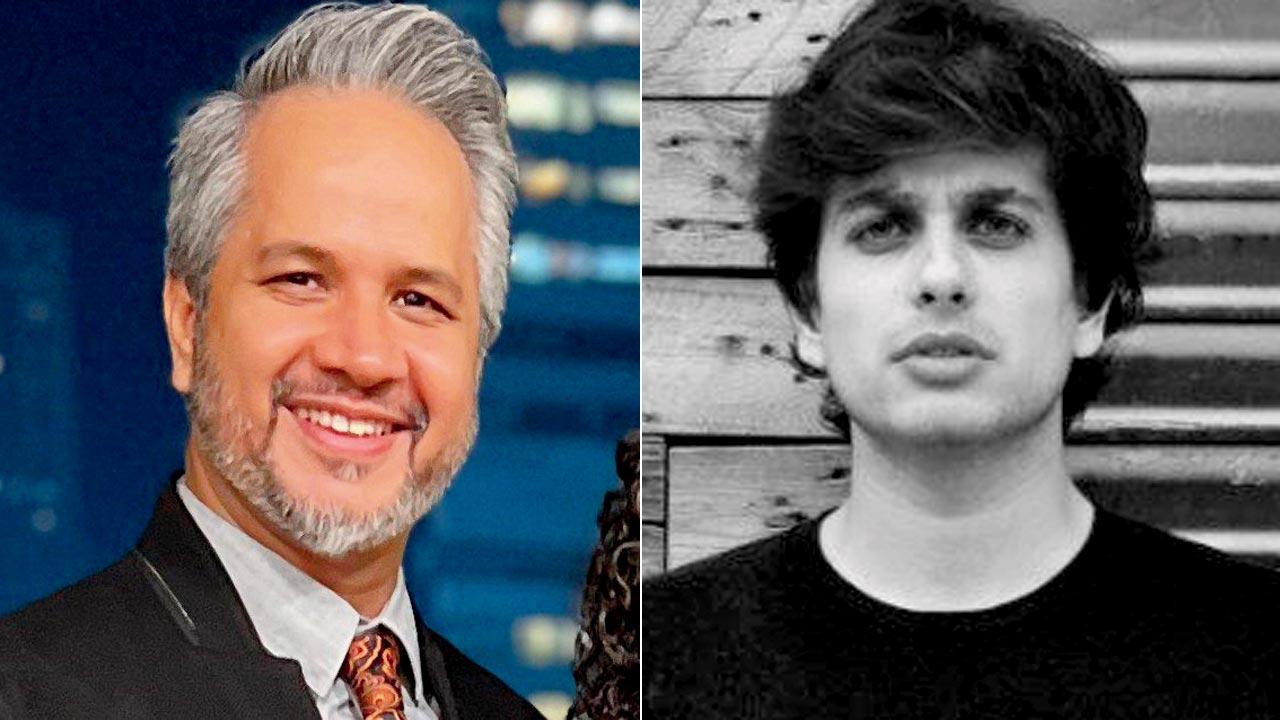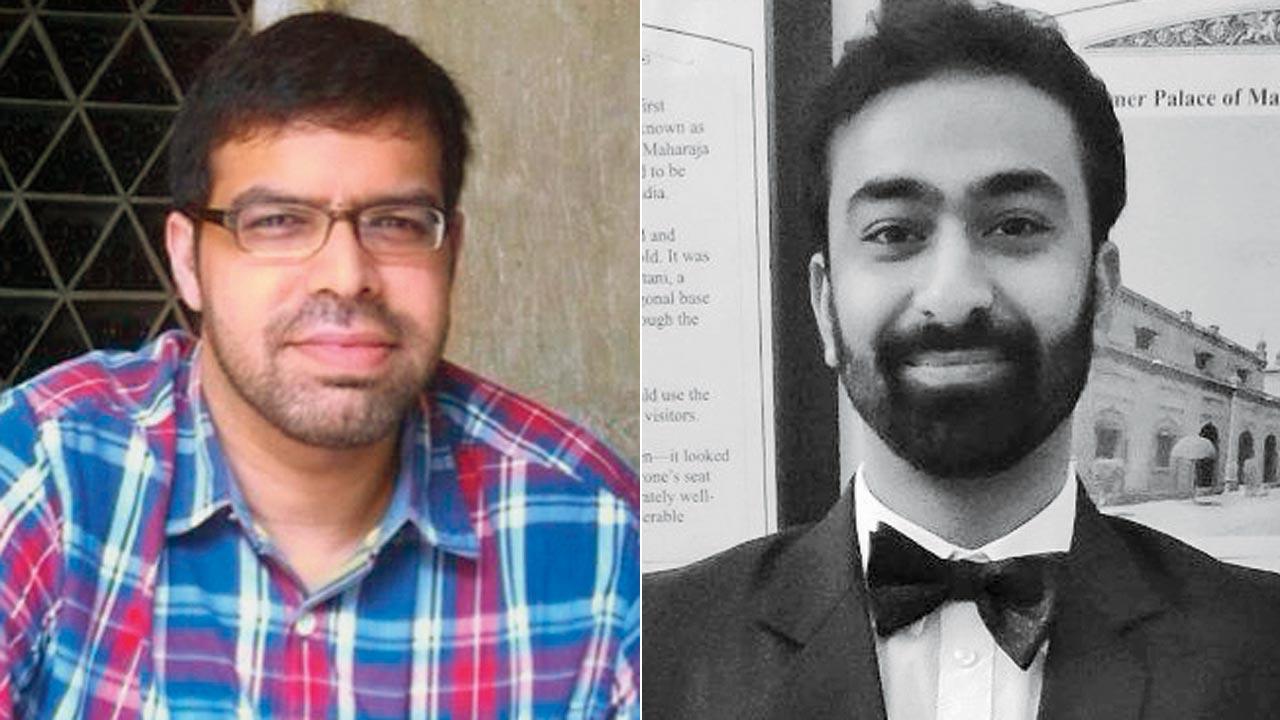Hanumankind’s performance at the Modi & US show has left everyone wondering—how will this affect his trajectory?

Hanumankind hugging PM Modi right after his song and altering the lyrics to his most popular song Big Dawgs has not gone down well with the artist’s fans, some of whom are now calling his hip-hop lifestyle merely an aesthetic. Pic/Hanumankind Instagram
On September 23, artists Devi Sri Prasad, Hanumankind and Aditya Gadhvi performed at the Modi & US show at the Nassau Coliseum in New York. The crowd consisted of over 15,000 members of the Indian diaspora from 42 different US states. And, performers got loud cheers from the audience and hugs from Prime Minister Modi.
ADVERTISEMENT
But Hanumankind hugging PM Modi right after his song and altering the lyrics to his most popular song Big Dawgs has not gone down well with the artist’s fans, some of whom are now calling his hip-hop lifestyle merely an aesthetic. “I think for a lot of his fans, it was a bit of a shock because he’s an artist who has spoken out against the establishment in the past through his lyrics. To see him, literally embracing it [the establishment] was disappointing, especially since younger artists are constantly told about the importance of being ‘authentic’ as musicians and this was kind of a U-turn,” says Amit Gurbaxani, a music journalist.
Others are applauding how far he has come. “He’s representing India and its soft power,” says Akshay Kapoor, founder of Indian Music Diaries. Musician and entrepreneur Raghav Meattle says, “I have a soft spot for artists. He’s on a trajectory that’s a dream. People are trying to pull down someone who is paving the way for others.”
 Girish Bobby Talwar and Raghav Meattle
Girish Bobby Talwar and Raghav Meattle
Hanumankind, aka Sooraj Cherukut, rose to international fame by releasing Big Dawgs earlier this year. It achieved a milestone by entering the Top 10 tracks on the Billboard Global 200 singles. The rapper’s Indian audience was thrilled, but it also helped him garner eyeballs from the West, with many applauding the fact that his music sounds like it could be from anywhere in the world. This is because Hanumankind was born in Malappuram, Kerala, but spent his formative years in Houston, Texas. He has also lived in France, Nigeria, Egypt and Dubai as his father moved around for work. His business degree secured him a job at Goldman Sachs, which he later quit to pursue a career in rap full-time.
Hanumankind’s music portrays this criss-crossed life, and he insists on being seen from a broader lens. In earlier interviews, he has stated, “I’m not an Indian rapper, but I’m a rapper from India,” and often prefers to place himself outside of India’s hip-hop scene.
So, why is his performance at a PM Modi event facing scrutiny from Indian fans? It’s the lyrics of Big Dawgs, which arguably demonstrate a rebellious mentality and a refusal to submit to authority. “Ten toes in when we standin’ on business” and “F**k the laws, lawyer with me, we ain’t gotta call”. In an earlier song, titled Genghis, he raps, “We got issues in our nation cause there’s parties at war.” But Gurbaxani argues, “Not all of HMK’s songs are anti-establishment. Big Dawgs, which has crossed over internationally, is more of a fun, braggadocious track. He had to change the lyrics for the event because they’ve got a lot of expletives.
So he altered them to sound more patriotic.”
 Amit Gurbaxani and Akshay Kapoor
Amit Gurbaxani and Akshay Kapoor
Historically, rap and hip-hop genres grew from rebellion, and such lyrics have always found a place in this style of music. Hanumankind is not the first rapper to speak about the struggles of street life, his contemporaries from India have been doing so for decades.
Besides, political activism in art is common, even if it’s not loud. There are ample examples in the West, but one can find smatterings of it in Indian music too. “You see that artists like Ankur Tewari also have some lyrics that one could say are anti-establishment. But, political activism does not define his music. I have written such songs too, and sometimes, I will say at a concert why I wrote that song. But any artist’s music is broad. You are defined by your entire discography—it’s a large body of work. Not just one song,” says Meattle. But there are ample examples of artists facing hate any time they go public about their political stand or activism. “I have received some scary DMs myself,” says Meattle.
Does this mean artists should keep activism at arm’s length from their art? “Censorship is very real in this country. The government pulls all sorts of tactics
to take content off the internet. But the beauty of art is that artists don’t need to be in the face, they can be cryptic. A lot of artists have historically used these strategies, in the West and here. It’s a very interesting space to be in,” says Kapoor.
Netizens speculate that a certain level of popularity must make it difficult to refuse invitations to perform at political events. Others say that his beliefs and political stand—drawn purely from his lyrics—don’t align with his move to perform at the New York event. “It makes me sad about the state of our country more than anything else. Why make this seem like a proud moment if he’s done something [performed at the New York event] under supposed coercion and it does not actually align with his beliefs?” says Gurbaxani, adding that it could also be a business decision. “He’s reaching out to an NRI audience, this is a very big platform,” he says.
It’s unlikely, though, that Hanumankind’s decision, commercial or not, will push fans away. “Performing for Modi is not going to affect him in any way,” says Meattle, when asked if other venues or music festivals might steer clear of inviting Hanumankind to perform. “He won’t face any backlash. Some of his fans are pissed off, but they’ll get over it, nothing else,” he adds.
The question then remains: How did a rapper whose lyrics are seen as “anti-establishment” get selected to perform at a showcase that welcomes a prime minister? “Typically what happens at a large gathering of people, you want to ensure that they are kind of excited. Music and performances become important at multiple rallies. They use a lot of actors and musicians who can bring the attention of people. I think the Indian diaspora is starting to look at musical genres in the rap space as being popular. Earlier, you would have Bollywood artists, today it’s Indian rappers. This signifies a cultural shift in terms of what people are paying attention to and what they are resonating with,” says Girish ‘Bobby’ Talwar, founder of Rebellion Management & Entertainment. He points to the fact that rock bands often perform at political rallies in the northeast, adding that for artists it’s an opportunity to play in front of an audience of thousands, rather than promote an agenda. He says, “I don’t think it is that deep a thought. I think it’s more for the crowds to be excited.”
It’s likely that Hanumankind and even Aditya Gadhvi (of the Khalasi song fame) could have purely been selected because their songs became a huge trend. To disappointed fans, Talwar asks, “Would a Hanumankind fan not want him to have 5,000 more fans in New York? Isn’t that a disservice as a fan if you’re telling him not to go to perform there?”
 Subscribe today by clicking the link and stay updated with the latest news!" Click here!
Subscribe today by clicking the link and stay updated with the latest news!" Click here!







